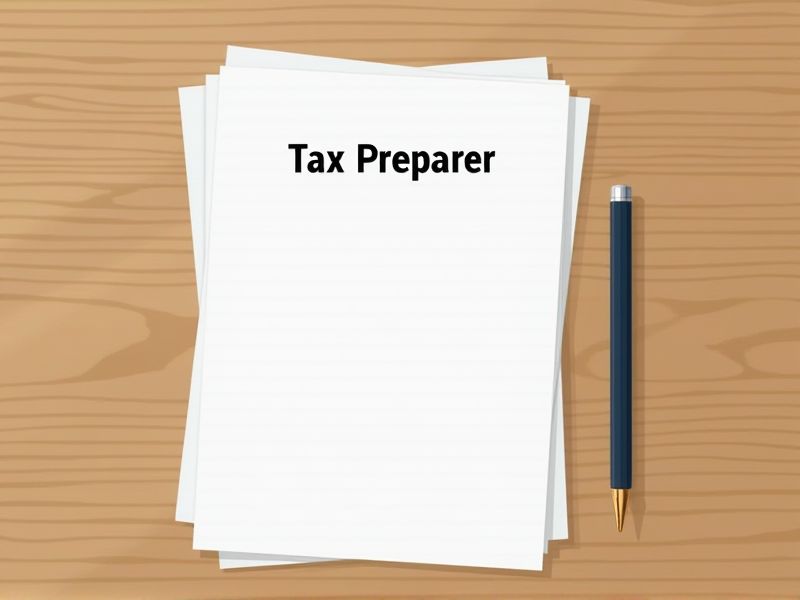
Tax preparers often handle complex tax codes and intricate financial details, requiring a high level of expertise and precision. Certifications serve as a validation of their knowledge and professionalism, ensuring that clients receive accurate and compliant services. These credentials also help in building trust with clients and can significantly enhance career opportunities in the competitive field of tax preparation. Essential certifications you might consider for becoming a tax preparer include the following.
Preparer Tax Identification Number (PTIN)
The IRS mandates the use of the Preparer Tax Identification Number (PTIN) to ensure that tax return preparers can be uniquely identified. This system aids in tracking preparer compliance with federal tax laws. Protecting sensitive taxpayer information becomes more efficient when preparers have a PTIN, reducing the risk of identity theft or fraud. Having a PTIN enhances accountability and professionalism among tax preparers.
IRS Annual Filing Season Program (AFSP)
The IRS Annual Filing Season Program (AFSP) increases a tax preparer's credibility by demonstrating a commitment to maintaining professional standards. It provides preparers with a Record of Completion, which can attract more clients through enhanced trust and recognition. Participants gain access to the IRS Directory of Federal Tax Return Preparers, potentially expanding their client base. The program also offers preparers the ability to represent clients before the IRS during audits, enhancing the service they can provide.
Enrolled Agent (EA)
Tax laws frequently change, so having an Enrolled Agent ensures compliance with current regulations. EAs have proven expertise through passing the IRS exam, offering better accuracy in tax preparation. They possess unlimited practice rights, meaning they can represent clients before the IRS for audits or disputes. Their deep understanding of tax codes and procedures minimizes errors, reducing the risk of audits or penalties.
Certified Public Accountant (CPA)
Certified Public Accountants (CPAs) possess advanced knowledge and expertise in tax laws, which enhances the accuracy and efficiency of tax preparation. Tax regulations are complex and frequently change, requiring CPAs to specialize in these alterations to minimize tax liabilities legally. A CPA's credibility can instill client confidence, as they must adhere to strict ethical standards and maintain licensure through continuing education. If any issues or audits arise, a CPA is also qualified to represent taxpayers before the IRS, providing critical support.
Accredited Tax Preparer (ATP)
Hiring an Accredited Tax Preparer (ATP) ensures compliance with the latest tax laws and regulations, which minimizes the risk of errors and penalties. The ATP credential demonstrates proficiency in tax preparation, providing clients with confidence in accurate and efficient handling of their tax matters. Taxpayers benefit from an ATP's commitment to continuing education, which keeps them informed of changes in tax codes and best practices. Professionals with ATP status can offer more strategic tax planning advice, potentially leading to financial savings for individuals and businesses.
Chartered Tax Professional (CTP)
Chartered Tax Professionals undergo rigorous training, which ensures they have a comprehensive understanding of tax laws and regulations. This expertise reduces the risk of errors during tax preparation, potentially saving clients from costly penalties or audits. CTPs provide personalized advice, helping individuals and businesses optimize their tax strategies for better financial outcomes. As tax laws become more complex, the demand for knowledgeable CTPs increases, supporting the need for their specialized services in the market.
Registered Tax Return Preparer (RTRP)
Regulatory compliance can become more efficient with a Registered Tax Return Preparer (RTRP) because they possess a validated understanding of tax laws. The presence of an RTRP can reduce the risk of errors on tax filings, leading to fewer penalties and audits. Taxpayers often seek trust and credibility, and RTRPs, having met specific IRS requirements, fulfill this need. The complexity of ever-evolving tax regulations often necessitates professional assistance, which an RTRP is specifically trained to provide efficiently.
Certified Tax Advisor (CTA)
A Certified Tax Advisor (CTA) enhances the accuracy of tax filings, as they are trained to understand complex tax codes and regulations. Tax preparers with a CTA can offer more insightful advice, minimizing the risk of audits by ensuring compliance and optimum deductions. Clients benefit from the expert guidance, which can lead to financial savings and strategic tax planning. The credential provides credibility and trust in the eyes of clients, distinguishing preparers in a competitive field.
Master Tax Preparer (MTP)
Master Tax Preparer (MTP) certification enhances a tax preparer's credibility, attracting more clients seeking reliable expertise. Possessing MTP credentials demonstrates advanced knowledge in tax laws and regulations, reducing the likelihood of making costly errors. By offering specialized advice on complex tax situations, an MTP can optimize clients' financial outcomes. Tax preparers with MTP designation often experience increased career opportunities and potential for higher earnings.
Certified Tax Resolution Specialist (CTRS)
A CTRS provides specialized expertise in resolving complex tax issues, which enhances a tax preparer's ability to handle challenging cases effectively. The certification ensures a comprehensive understanding of IRS protocols and tax laws, mitigating risks of costly errors. Clients value the trust and confidence that come from working with a tax professional who holds advanced qualifications. The presence of a CTRS can attract clients facing serious tax problems, expanding the preparer's client base and service offerings.
Summary
When you obtain certifications as a tax preparer, clients are more likely to trust your expertise. This trust often leads to increased clientele and potentially higher income. The certifications also enhance your ability to handle complex tax situations, improving overall service quality. Gaining recognition in your field can open more opportunities for professional advancement.
